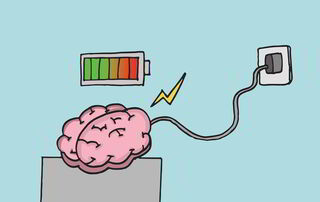Dopamine
Dopamine Fasting to “Reset” Your Brain: Pros, Cons & Results
Reducing the feel-good chemical aims to “reset” it to appreciate simpler things.
Posted August 25, 2020 Reviewed by Ekua Hagan

Dopamine: The everything chemical
Although secreted only by a relatively tiny group of cells in the brainstem, its influence is huge, reaching every nook and cranny of the nervous system. It participates in numerous tasks ranging from lactation, kidney function, and digestion to maintaining blood pressure and regulating color sensitivity in the retina’s cone cells.
A dopamine fast entails cutting back on or entirely eliminating many of life’s pleasures such as food, sex, social media, socializing, technology, entertainment—even eye contact.
Adherents led by the self-appointed fitness guru “Doc” Cameron Sepah, a psychologist in the beach haven of Santa Monica, California, propose that cutting back on hedonistic pleasures can make the brain more efficient and better able to savor simple things.
The logic behind dopamine fasts
Yet, what does that mean given that you can’t fast from a naturally occurring brain transmitter that is needed for everyday functioning? Also at odds with the premise that less dopamine is good for you, consider that a dearth of dopamine production in the brainstem is the hallmark of Parkinson’s Disease while a number of treatments for depression aim to increase its concentration in the brain.
It is true that dopamine is implicated in many addictive behaviors, and here Sepah enumerates six that his regime purportedly targets: (1) emotional eating, (2) obsessive gaming and internet use, (3) compulsive gambling and shopping, (4) compulsive masturbation and pornography viewing, (5) thrill-seeking, and (6) recreational drug use.

Adherents misinterpret both science and the concept of a dopamine fast. They regard the neurotransmitter as if it were cocaine or a deadly narcotic, and therefore fast in the mistaken expectation of giving themselves a break in tolerance.
They believe too much stimulation has depleted their dopamine stores, that fasting will replenish them, and that they will experience whatever they deny themselves—food, sex, emotional contact—more intensely when they indulge in it once again.
Unfortunately, the body doesn’t work that way, and cutting out rewards may be counterproductive: It doesn’t stop us from craving them and secreting dopamine in response. Forgoing lottery tickets, social media hits, or masturbation doesn’t “reset” anything. It just leads to frustration.
A catchy title, but misconstrued
Sepah acknowledges the misconception. “Dopamine is just a mechanism that explains how addictions can become reinforced, and makes for a catchy title,” he told The New York Times. “The title’s not to be taken literally,” he admitted.
Unfortunately, the “catchy title” has led to a cadre who eschew what they imagine are excessive dopamine inputs and deprive themselves of normal things for no reason other than faulty logic. Says one young entrepreneur in the Times interview, “I avoid eye contact because I know it excites me. I avoid busy streets because they’re jarring.” He must “fight the waves of delicious [smelling] foods” peddled by street vendors.
But, again, we need dopamine for everyday brain and body functions.
How to break unhealthy habits
As for unhealthy behaviors that you might wish to abolish, think instead in terms of a stimulation fast.
If you wish to cut down, then reduce your exposure to the environmental cues that trigger a particular desire in the first place. If you spend evenings alone glued to your phone, you could turn it off or put it away until morning and occupy yourself differently. If you drink too much and pass the hours at a bar, you might practice spending time elsewhere in the evening.
It is social cues like these that initiate cravings and impel behaviors that help us achieve the specific reward.
The wellness industry has become so lucrative that people create snappy titles for age-old concepts like a day of rest, a moment of meditation, letting yourself feel lonely or bored. And sometimes just taking a break. These are proven ways of rediscovering pleasure in simple things.
Please email comments via the Author Profile, where you can also ask Dr. Cytowic for copies of articles and papers, including "Your Brain on Screens."




